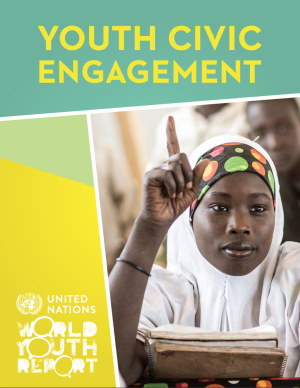The World Youth Report on Youth Civic Engagement, prepared by the United Nations Department of Economic and Social Affairs (UN DESA), explores young people’s participation in economic, political and community life. UN DESA provides an interface between global policies in the economic, social and environmental spheres and national action.
The UN World Youth Report offers fresh perspectives and innovative ideas on youth engagement, and is intended to serve as an impetus and tool for dialogue, policy discussion and action between youth and government. The current Report responds to growing interest in, and an increased policy focus on, youth civic engagement in recent years among governments, young people and researchers. The Report provides thematic insights on economic, political and community engagement, coupled with expert opinion pieces so as to provide robust and varied perspectives into youth engagement.
Youth Engagement in economic, political and community life
The transition from youth to adulthood marks a key period characterized by greater economic independence, political involvement, and participation in community life. Such engagement not only impacts the individual and community, but can act as an enabling force for young women and men’s involvement in the development and formulation of youth-related policies. However, a young person’s ability to effectively engage relies heavily on the socioeconomic and political environment in which they live. While access to free and open internet, political demonstrations and peacebuilding initiatives can confer long-term benefits to both the individual and community, a lack of decent jobs, limited access to labour rights and social service spending can impose long-term negative consequences on a young person’s life-long ability to engage. Such conditions can also impact long-term negative consequences on development and social inclusion more broadly.
Economic Engagement
Youth unemployment: an ongoing challenge Unemployment affects more than 73 million young people around the world. In some developed countries, the youth unemployment rate has climbed above 50 per cent. In low- and middle-income countries, underemployment in the informal sector is considered the primary employment challenge faced by young people. As a consequence, for many young people today, economic engagement has become more challenging owing to the lack of decent employment opportunities. In addition, inadequacies in skills and education, the lack of support for entrepreneurship, and diminishing labour rights have profound impacts on youth economic engagement.
Chapters:
- Chapter 1 INTRODUCTION
- Chapter 2 ECONOMIC ENGAGEMENT
- Chapter 3 POLITICAL ENGAGEMENT
- Chapter 4 COMMUNITY ENGAGEMENT
- Chapter 5 CONCLUSION AND RECOMMENDATIONS
![]()
 Welcome to the United Nations
Welcome to the United Nations
